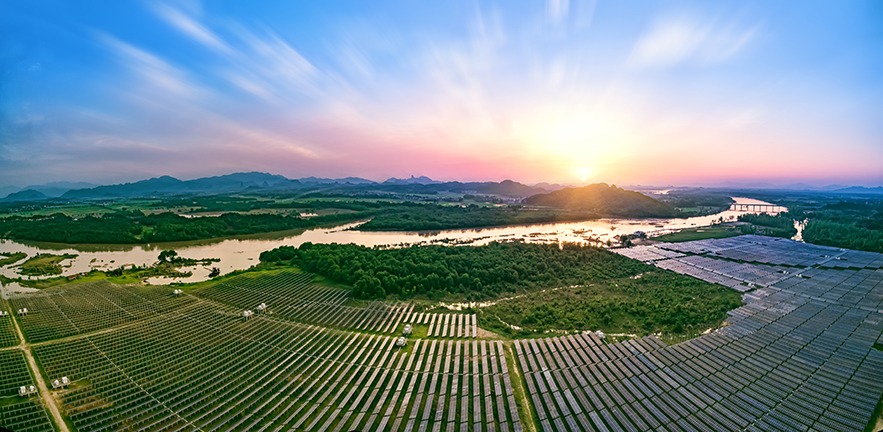Green innovation is key to addressing climate change, Kamiar Mohaddes of Cambridge Judge Business School says in latest webinar of Business Schools for Climate Leadership.
Green innovation by the private sector supported by governments is key to tackle climate change while ensuring continued economic growth and prosperity, Dr Kamiar Mohaddes of Cambridge Judge Business School told a global webinar.
The two approaches to realising net-zero

There are two main approaches to cutting emissions and achieving net-zero targets. One entails degrowth, the scaling down of production and economic activity, a techno-pessimist approach. The other is adopting green-related investments and decarbonisation policies to maintain economic production and limit climate impacts, a techno-optimist approach. The de-growth option would have a devastating effect on the most vulnerable people in society and emerging and developing countries, said Kamiar, Associate Professor in Economics and Policy at Cambridge Judge.
The private sector is key to green innovation, “but there needs to be incentives and regulation, and governments need to actively invest in this area,” he said in the 17 June webinar that was part of the Business Schools for Climate Leadership cooperation that includes Cambridge Judge and seven other European business schools.
Competitive green energy and the economic impact of green investments
The reason wind and solar energy have become competitive is through deployment, technological innovation and learning by doing (which in turn keep reducing the cost of solar and wind, and in turn make it competitive in new markets), and this came about mainly through government incentives and investments in the US and subsidies in Europe over the last decade or so. “Governments play a huge role in this,” he said, also citing the high electric car penetration in Norway due to high taxes on conventional vehicles and a big government-supported network of charging points.
A report last year by Kamiar and two other University of Cambridge economists for KPMG, based on patent filings, showed that green innovation can deliver economic growth that is equal to or greater than non-green innovation. The report looked at over 24 million patent filings from 1990-2018 for 43 countries.
Kamiar was joined in the webinar by Knut Haanaes, Professor of Strategy at IMD business school in Lausanne, Switzerland, in a session moderated by Marya Besharov, Professor of Organisations and Impact at Oxford Saïd Business School.
Latest IPCC report calls for urgent action
The title of the webinar was “Latest IPCC report and Climate Leadership: the risks and opportunities”. The Intergovernmental Panel on Climate Change report in April said that current carbon reduction policies are insufficient, and unless changed would lead to a catastrophic rise in temperature by 2100.
Business Schools for Climate Leadership was formed just prior to the COP26 climate-change summit in Glasgow last November, and is now in its second series of webinars featuring academics from the eight participating business schools.
Climate change means both hotter and colder temperatures
Kamiar explained in the webinar that discussion about the relationship between climate and the economy goes back many centuries, perhaps to the 14th Century. But when people talk about climate change they usually only consider the rise in the level of temperatures over time, but along that path there will be substantial volatility in temperatures too which is generally not considered in modelling. However, in Kamiar’s co-authored work they consider deviations of climate variables (temperature and precipitation) and explicitly model changes in the distribution of weather patterns – not only averages of climate variables but also their variability.
“In fact we now have years that are colder than usual, and years when the temperatures are substantially higher than usual,” and both divergences lead to long-lasting adverse impacts on real output, employment and various economic sectors,– not only in terms of agriculture but also in retail, transportation, manufacturing, mining and many other sectors.
“Climate change is not just an issue for poor and hot countries, but also rich and cooler countries,” Kamiar added. “Climate change affects productivity growth, and if you compound that over many years you get very high economic losses.”
The latest IPCC report, said Knut Haanaes, is “very convincing and also very depressing. We’re moving, but we’re moving far too slowly without the power that’s needed,” so he echoed Kamiar’s call for ‘carrots and sticks’ from government to entice business to do more in the green energy area.
“New startups today are greener than 20 years ago and greener than established companies”, he said, adding that startups are important as innovation engines for larger firms they collaborate with.
How to get to net-zero: shared narrative is needed to tackle climate change collaboration challenge
Marya Besharov said one of the challenges to fight climate change is collaboration with a diverse range of stakeholders – ranging from activists to investors to non-governmental agencies.
“We need a shared narrative, a shared way of seeing the problem in order to motivate a shift in behaviour,” she said, including greater trust between the Global North and Global South and increased accountability of both government and the private sector.
“We all know how this is going to end,” concluded Knut Haanaes. “We all know we will get to net zero, but the question is when. Can we get there faster than we are now, and can we get there in a fairer way?”


